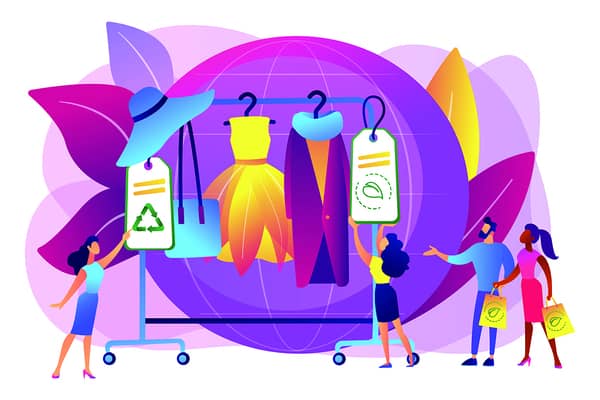Today, on April 22, we celebrate the 51st birthday of World Earth Day. And what better time to reflect on our individual impact on the planet? What changes should we be making to build a more sustainable future?
When we think of fast fashion in the context of the environment, there are often many problematic associations that come to mind. However, consumers are increasingly aware of these sustainability issues around fashion and apparel and there is a growing mood among them that it is not acceptable.
Here are some key examples I pulled together from the Fast Fashion 2021: Sector Analyst Report reflecting how the fashion industry is innovating to create more eco-friendly methods of manufacturing and selling that drive business growth.
Second hand apparel
The re-sale of pre-loved apparel has not only skyrocketed in popularity, but is playing a huge role in highlighting the benefits of selling old stock and creating new business opportunities within the fashion sector. In fact, the second-hand apparel market in the United States is already worth in excess of $35m and is set to almost double to $64m by 2024. While eBay could be argued to have started the recommerce market, the marketplaces and third-parties dedicated to selling second-hand apparel that are springing up around fast fashion are adding to this.
Celebrities are also endorsing the move to second-hand with, among others, Kate Middleton, Meghan Markle, Amal Clooney, Cardi B and Kim Kardashian all shopping at vintage dealers for clothes that they then prominently displayed at public engagements. Charity Oxfam, meanwhile, challenged celebrities to buy nothing new for 30 days in 2019 in order to encourage the circular economy.
Energy use
Chief among the steps that the industry can take to create sustainable operations is to look at its use of energy, water and raw materials. Cutting energy use and aiming for carbon neutrality is a key driver for many retailers in the sector to meet these consumer demands.
RetailX observes that many players are now working together to make this happen:
- Zalando has joined the RE100 global clean energy consortium after pledging to cut carbon emissions in its own operations by 80% before 2025.
- RE100 is a coalition including IKEA and Burberry that has made commitments to go 100% renewable – is looking to bring together key retail players in order to share ideas and practical steps to bring about carbon neutrality.
- Zalando has also said that over the same period its private label production would reduce emissions 40% per €1m of gross profit, compared to 2018.
- Measures taken will include powering all sites with electricity from renewable sources such as solar panels, as well as retrofitting existing warehouses.
- The fast fashion company has also said that it would require 90% of its partners, including brands and logistics partners, to reduce their own emissions.
The power of the people (consumers)
When it comes to making a difference, all parties need to play an active role. And that’s exactly we’re seeing from consumers who, little by little, are coming forward and demanding more transparency in how their products are being made and their overall impact on the environment. This presents a growth opportunity for retailers in the sector as they have to adapt to sell how and what consumers demand.
As demonstrated by our research, 57% have made significant changes to their lifestyles to lessen their environmental impact, while more than 60% report going out of their way to recycle and purchase products in environmentally friendly packaging.
Seeing this move away from the cyclical nature of fast fashion is great news for the planet; as well as a potential vector for growth as consumers redirect their demand towards greener companies.
Original analysis featured in this article can be found in the Fast Fashion 2021: Sector Analyst Report. For more information on the future direction of sustainability amongst Europe’s leading retailers and brands, download the Sustainability Report 2020.









